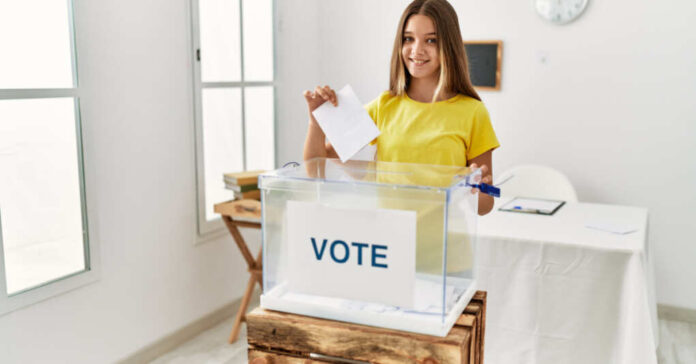
Liberal ideology is a young person’s belief system, and Democrats are betting on the youth vote to keep them in power with no fraud or shenanigans involved.
The concept of giving the vote to kids is not a new one.
In 2019, Representative Ayanna Pressley (D-MA) introduced legislation lowering the voting age to sixteen as part of the federal election overhaul in the For the People Act. Unsurprisingly, Democrats were nearly unanimous in their support, while Republicans were able to block the bill’s passage in an equally united front, opposing amendment 197-1.
The reason for the push to lower the voting age to sixteen is due to the success of liberal indoctrination in the public school system. Ayanna Pressley (D-MA) admitted in 2019 that the youth vote was essential for the power grab, pointing out that teen activists, such as those advocating for gun control, could play an important part in keeping Democrats behind the wheel.
“Young people are at the forefront of some of our most existential crises,” Pressley said. “The time has come. Our young people deserve to have the opportunity to exercise their right to vote.”
In 2019, Democrats overestimated their ability to push their transparent power grab across the finish line. That doesn’t mean the struggle is over, however. It means that they redefined the playing field.
Rather than allowing school-aged children to vote in federal elections, Democrats lowered their expectations and pushed to lower the age requirement in local elections in several states across the nation. This scaling back is a necessary first step to normalize sixteen as the new voting age and move the changes to federal elections, tipping the scales permanently for Democrats.
The most recent addition to states permitting teens to vote is Brattleboro, Vermont, which has decided to not only allow 16-year-olds to vote in local and school board elections but also hold the highest elected offices and serve as representatives at town meetings to help decide the fate of local issues.
Governor Phil Scott vetoed the bill, telling lawmakers, “I believe it is important to encourage young Vermonters to have an interest in issues affecting their schools, their communities, their state and their country.”
He went on to add, “However, I do not support lowering the voting age in Brattleboro, nor lowering the age to run for Town office and sign contracts on behalf of taxpayers.”
Naturally, his veto meant nothing and was overridden to effectively allow the changes to local election laws. And the reason is clear, as stated by avid youth vote supporter Rio Daims. Daims explains that lowering the voting age “will bring a new wave of civically engaged youth up through their teenage years” and laments that it has taken this long to enact the legislation.
Make no mistake. The “civically engaged youth” will not be conservative. This is an entire generation of kids who have gone to school in “woke” classrooms, learning that guns are evil, abortion is acceptable, former President Trump was the devil, and all Caucasians are white supremacists who continue to be a threat to minorities.
This demographic gets its news and information from social media, with 59% of Generation Z listing sites such as YouTube, Snapchat, and Instagram as their primary sources of political information.
Recent findings regarding governmental interference, collusion, and censorship of all social media platforms show that Democrats are firmly in control of the information followers view. This limits Generation Z’s ability to form usable, informed opinions about the hot-button issues at stake.
But the United States isn’t alone in pushing for lowered voting ages. Croatia and Bosnia already allow employed 16-year-olds to vote, while the Dominican Republic, Indonesia, and Hungary allow married teenagers to vote.
In North Korea, 17-year-olds vote with no restrictions.
How much of a threat to conservatives is underage voting? Probably not as marked as you would think. Per the last US Census report, the age group most likely to vote was those 65 to 70; turnout there was 76%. The demographic least likely to vote was among those aged 18 to 24, with just over 50% of registered voters turning out to vote.
Influence plays a significant role in the political beliefs of the young, and this generation was raised under liberal millennial parents, teachers, and social media influencers.
For North Korea, having a dictator that kills people for opposing votes helps maintain the balance. It’s an amendment Democrats may introduce prior to the 2024 election.














